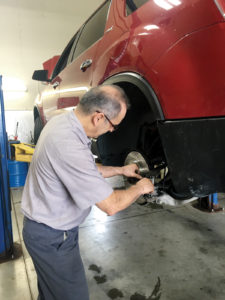Learn how ongoing training can improve you and your employees.
 As a mechanic, Orlando Ochoa knows firsthand how important it is that he knows how to perform his job. As a small-business owner, he also understands the need to stay up to date with the newest vehicle mechanical systems in order to provide the best service to his customers. That’s why Ochoa, who owns Orlando’s Automotive in Johnston, attends several trainings each year to educate himself.
As a mechanic, Orlando Ochoa knows firsthand how important it is that he knows how to perform his job. As a small-business owner, he also understands the need to stay up to date with the newest vehicle mechanical systems in order to provide the best service to his customers. That’s why Ochoa, who owns Orlando’s Automotive in Johnston, attends several trainings each year to educate himself.
“I’m always taking classes because there’s always something new coming,” he explains. “Manufacturers are always coming up with something new. You have to keep up with that.”
We provide answers to the three main questions small-business owners have about educating themselves and providing professional development opportunities for their employees.
1. Who needs continuing education?

who owns Orlando’s Automotive in Johnston, attends several trainings
each year to educate himself about new vehicle mechanical systems.
The short answer is everyone, from the owner to the newest hire. And education doesn’t just help the employee; it benefits the employer, as well, according to Training magazine, a professional development resource.
Continuing education allows a business owner, or his or her employees, the opportunity to further advance their
knowledge, which can be vital to the growth and success of the business. Giving employees an opportunity to learn more also has been shown to increase their engagement and interest in their employer, business experts say. Companies that offer continuing education are able to attract and retain more talented individuals and have the methods in place to create their own pipeline of skilled workers who can advance in position if one becomes
available.
Chris Goering, the owner of Brightline Fence and Deck Staining in Grimes, had years of business experience
before he started his company in 2014. It helped him in the areas of sales, customer service, understanding profit and loss, and budgeting.
“You learn as you go,” he says. “Those two experiences (of past jobs) helped me develop my understanding for
how to operate a business.”
Professional development and continuing education are required components for the teaching staff at the Johnston Community School District, says Laura Sprague, the director of communicationsfor the district. This includes a combination of types of continuing education opportunities to help give teachers more skills to improve
classroom instruction, she says.

Staining and Brightline Custom Blinds in Grimes. Chris
attended training courses to learn about the products the
couple sells and relied on his previous business experience to launch the businesses.
Goering says he doesn’t conduct continuing education for his employees, so much as what he calls a continuing
conversation. Every day, he meets with employees — two full-time employees and up to seven during the peak
season — to review their jobs for the day and discuss any maintenance issues, techniques or product questions they might have, and anything else that needs to be addressed.
Goering spends one-on-one time training each of his employees but continues to work with them daily to educate them on various issues.
Des Moines Area Community College recently created information for immigrant and first-generation small-business owners to help them with some skills they may need to develop in order to be successful with their
business or to start a business. This includes information about DMACC’s high school equivalency test, English as Second Language classes, access to Spanish-speaking counselors and mentors and entrepreneurship, accounting and business administration courses.
2. What options are available?
A first step to offering continuing education would be to determine what employees want to learn: Are there specific skills they need to better perform their job? Would they like to have an advanced degree? Do they struggle in a particular area?
Once the business owner determines what training is needed, then he or she can find what options are available. Local higher educational institutions may have specific continuing education programs for small business owners.
Many of the non-credit certificate programs are created based on requests from business owners, says Mike Hoffman, the executive director of continuing education for DMACC. Other business owners may not have the necessary basic skills to operate a business. DMACC offers a variety of continuing education programs for business owners and their employees.

offers employees a variety of ways to learn and enhance their teaching skills.
 Some of the more popular courses are the ones about QuickBooks and Microsoft Office programs including those about Excel, says Julie Bundy, DMACC’s coordinator of continuing education. There are three levels of classes: basic, intermediate and advanced. Each course is one day.
Some of the more popular courses are the ones about QuickBooks and Microsoft Office programs including those about Excel, says Julie Bundy, DMACC’s coordinator of continuing education. There are three levels of classes: basic, intermediate and advanced. Each course is one day.
DMACC also works with SCORE, a nonprofit that educates entrepreneurs and small-business owners on how to start, grow and succeed in their business, in a course called SimpleSTEPS for Starting Your Business. The course gives business owners or entrepreneurs information about how to improve their business practices or learn about marketing, tools and templates that can help their business, she says.
DMACC will offer another nine-month leadership series in January, which includes one course each month about a different topic. The course is promoted as a way for business owners to help develop their employees into leadership positions. Course topics include an introduction to management, how to have difficult conversations, and other issues a business leader may face. Bundy says this course would be good for a business owner/manager or for certain employees who may have specific development needs.
DMACC courses range in cost from less than $100 to more than a $1,000.
If the business can’t find a higher education program that fits its needs, another option is individualized certificates for employees based on their area of expertise. For example, the Association for Talent Development, a nonprofit that serves those who develop talent in the workplace, offers memberships and certificate programs.
The Johnston Community School District takes part in a state grant that has allowed it to implement a teacher leadership system where instructional coaches and teacher mentors work with other teachers to improve their classroom instruction.
Each week, the district also has a one-hour early out on Wednesdays. During that time period, each building’s administrator directs professional learning for his or her own school. Johnston school leaders also schedule seven full days of professional development for teachers. Teachers are paid for their attendance at professional development trainings or days.
The district also reimburses teachers who have a bachelor’s degree and pursue a higher degree or additional certification/training. They can receive up to $900 a year for a higher degree and up to $600 a year for additional training or certification.

Experts say tuition reimbursement shows the employee that his or her employer is vested in creating a future for the individual at the business. Any tuition reimbursement program will need to have specific guidelines about what types of classes the employee must take in order to receive reimbursement, as well as information about any limit on classes or maximum reimbursement and requirements about when the employee must take classes.
When Goering first started his business, he attended trainings hosted by the company from which he buys his products. Since then, he’s used YouTube videos and tried different staining techniques on his own in order to learn more.
In addition to YouTube videos, business owners can utilize free online courses through the U.S. Small Business Administration. There may also be free seminars or guest speakers. If the business owner belongs to a local chamber of commerce, the chamber might host webinars or other learning sessions.
3. How will this benefit my business?
Ochoa, the owner of Orlando’s Automotive in Johnston, relies on classes from auto part manufacturers, vehicle dealerships and online trainings to learn more in his profession. He spends anywhere from several hundred dollars to $1,000 or more for each training.
The trainings may cost money, but Ochoa believes it makes him better prepared to perform work for his
customers.
“Other places don’t do that,” he says. “It takes them longer to repair the car if they don’t do the trainings. They have to find information on the Internet.”
Goering says knowledge of his products allows him to provide the best service to customers whether it be through the deck staining business or Brightline Custom Designs, which he and wife, Ashley, started in October 2017. He took Internet classes to learn about the blind products they sell and install as a requirement from the product vendor.
“They definitely want you to have the product knowledge with the information on how to install the blinds the right way,” Goering says.
Johnston administrators provide teachers with the most professional development opportunities they can, Sprague, the district’s communications director, says.
“It’s almost like preventative care,” she says. “We do all of these things to keep our teachers up to date, to give them the latest in learning, … so they can meet the standards for our accreditation and make us a more attractive district.” ♦


Addelay
Compra De Viagra En Espana KewSnale cialis pills for sale BEIDOOWEWMIB Quotazione Levitra 10 Mg
superbeets review
It’s an amazing piece of writing in support of all the online viewers; they will take benefit from it I am sure.|